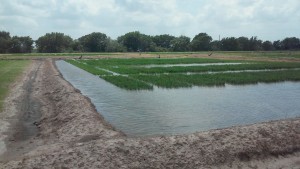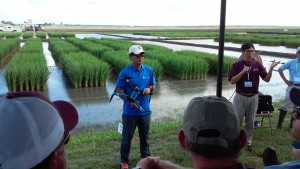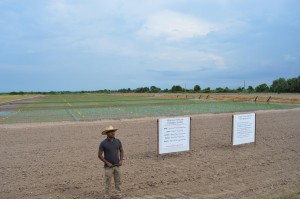During the Beaumont research station field day I was able to learn not only about research projects going on at A&M, but I also had the opportunity to listen to a few projects going on in Mississippi State and North Carolina State University. While listening to the different research projects I noticed that one of the leading concepts guiding these projects was the use of water in rice fields. Rice production requires an enormous amount of water which is sometimes a problem in times of drought. Although Texas is among the leading rice producers in the United States, water usage and efficiency are top priorities as scarcity becomes more common. The presenter from Mississippi State spoke about an ongoing project revolving the idea of reducing the amount of water used in rice production and letting the soil dry down to a crack. He is now testing for yield variability and looking for statistically significant differences in yield output.
One of the most notable things during both field days was how eager the farmers were to learn and communicate with each other. The business is constantly changing and they depend on extension events such as this one to keep themselves informed of changes coming their way. Additionally, events such as the rice field day highlight the importance of interaction between different departments of focus such as entomology, soil and crop, and weed science. Many times there are several problems affecting problems and it requires the help and cooperation of various experts to help them get through a rough season. Extension programs like the AgriLife Research System of Texas A&M provide these research services that can provide farmers with annual information keeping them up to date with the latest news and developments to maximize their field potential.



